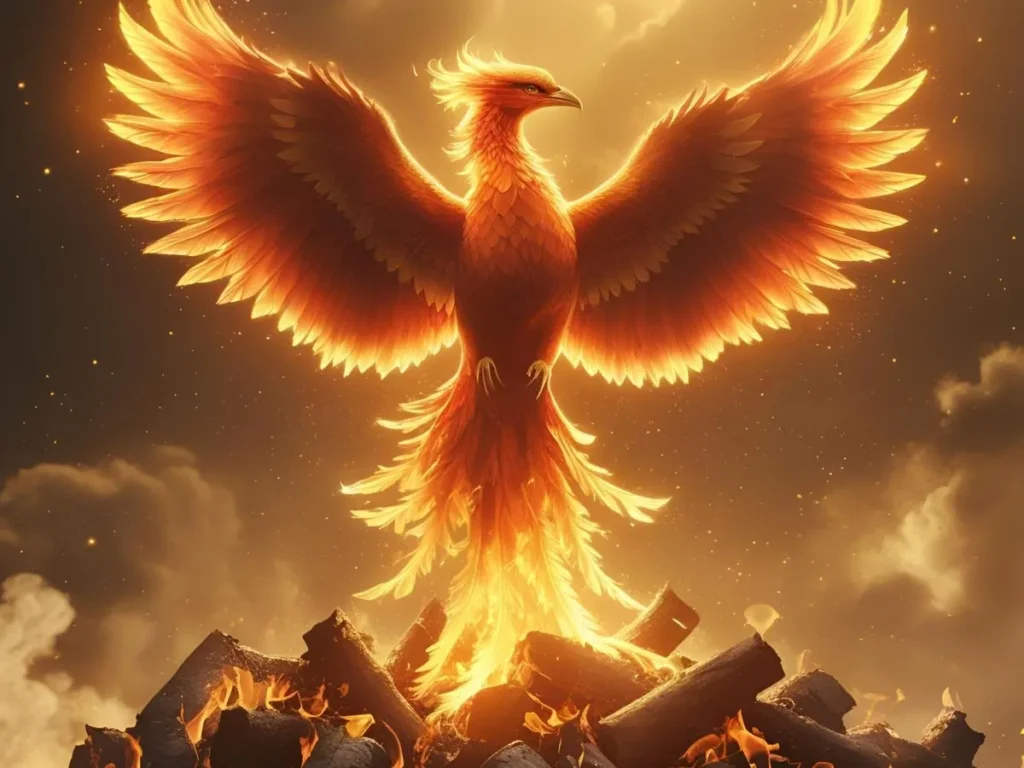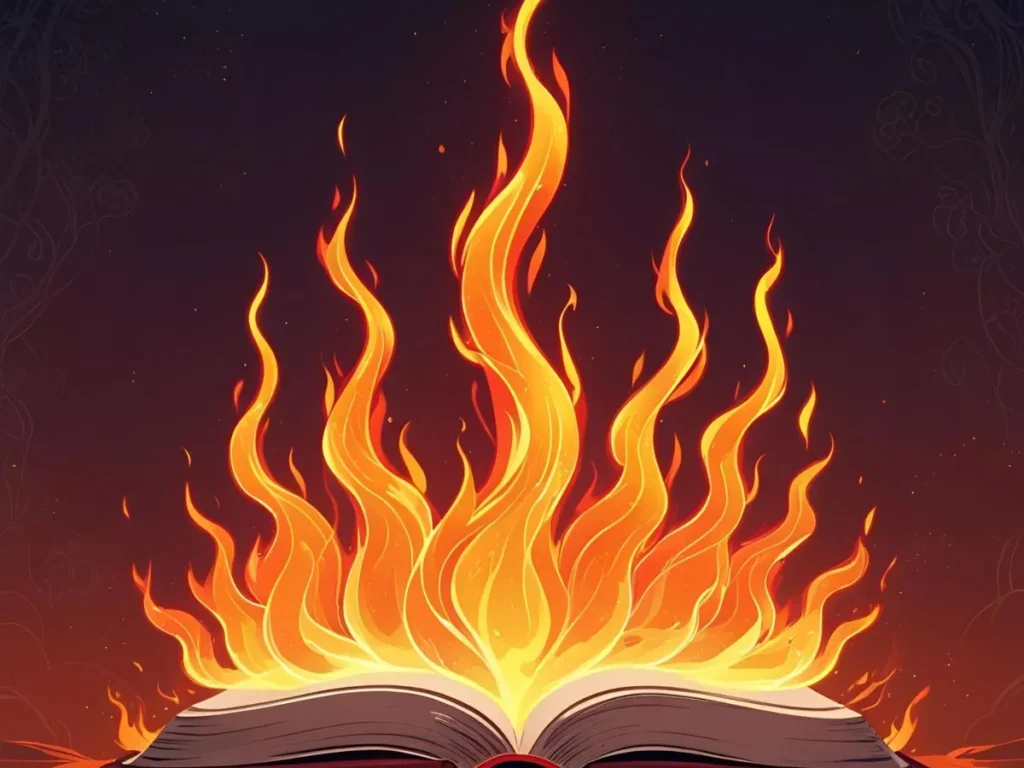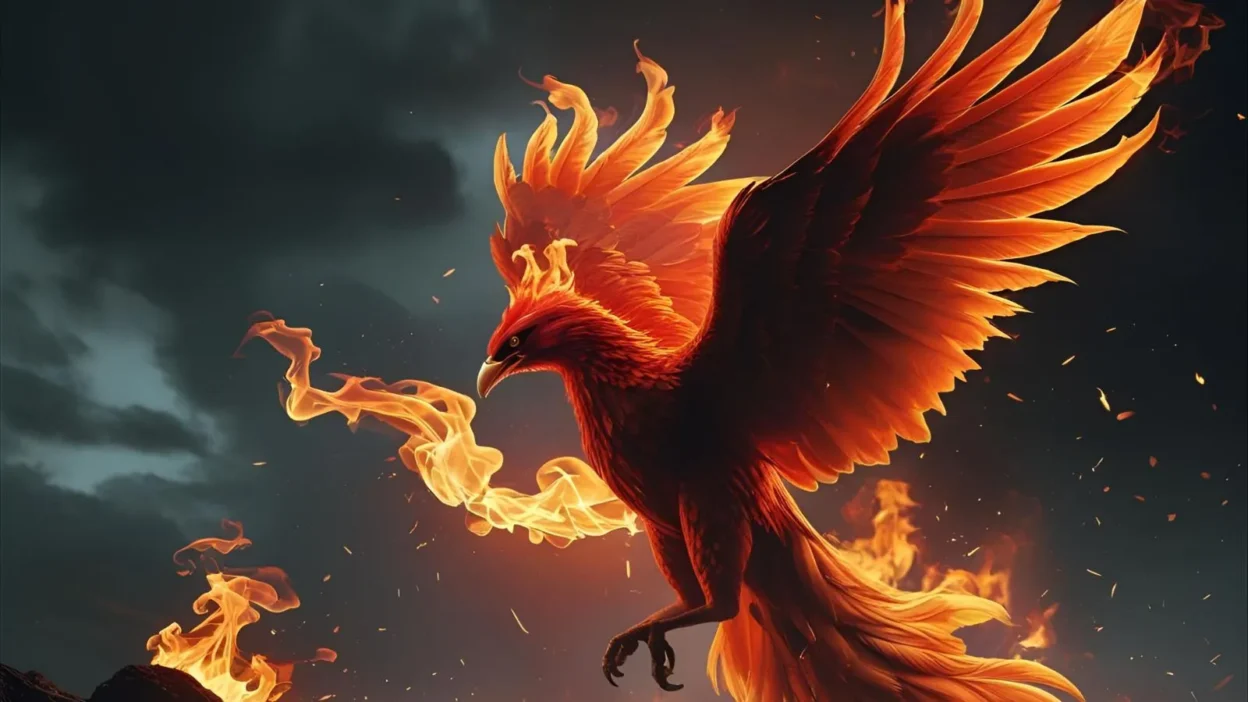I remember sitting near a bonfire one chilly evening, staring into the dancing flames. As the wood crackled and sparks flew into the night sky, something inside me stirred.
I felt warmth—but also a strange pull. I realized fire was more than heat. It was life, change, pain, and healing. That night, I began a journey of discovering fire symbolism in stories, spirituality, and real life.
Fire is everywhere. In the pages of classic novels, in sacred scriptures, in dreams, and even in our emotional experiences. But what does it mean? What does it symbolize spiritually or emotionally?
Let’s explore the deep, transformative power of fire through literature and faith—and see what it reveals about our inner world.
Fire Symbolism in Fahrenheit 451🔥

In Ray Bradbury’s Fahrenheit 451, fire symbolizes both destruction and rebirth. At the start of the novel, fire is used to burn books—tools of knowledge and freedom. It represents control, censorship, and fear.
But as the story unfolds, fire takes on a new meaning. When Montag escapes the oppressive society and meets the book-loving outcasts, he sees fire differently. It’s warm. It brings people together. It cooks food. Fire becomes a symbol of hope and new beginnings.
Bradbury’s fire shows us that destruction can lead to transformation. Sometimes, things must burn for something better to rise. Just like the mythical phoenix, fire in Fahrenheit 451 teaches us about the painful beauty of change.
Fire Symbolism in Lord of the Flies🔥
In Lord of the Flies by William Golding, fire plays a critical role. At first, it’s a signal of rescue—a way to call for help. But later, it becomes dangerous and wild. Fire turns into a tool of chaos and violence, especially in the final scenes when the boys set the island ablaze.
This shift shows how something meant for good can become destructive when people lose their way. The fire in Lord of the Flies is a symbol of civilization, power, and fear—a reflection of the boys’ inner struggles.
The story reminds us that fire, like human nature, can be both light and darkness. It depends on who controls it, and why.
Fire Symbolism Spiritual🔥

Spiritually, fire represents transformation, purification, passion, and divine energy. Many cultures believe fire can cleanse negativity, burn away past pain, and bring clarity.
In dreams, fire may signal deep emotional change. Spirit guides may send fire as a message: Something must end so something greater can begin.
Shamans use fire ceremonies to release old patterns. Meditating with a candle can spark inner vision and healing. Fire symbolism in spirituality is powerful—it lights the path to awakening.
Think of fire as your inner flame—your soul’s passion, truth, and growth. When you feel “on fire,” you’re likely aligned with your purpose. When fire rages emotionally, it’s often a sign you’re being pushed to evolve.
Fire Symbolism Christianity🔥
In Christian symbolism, fire is a strong presence. It can represent God’s presence, the Holy Spirit, divine judgment, or spiritual cleansing.
At Pentecost, the Holy Spirit appears as tongues of fire, symbolizing divine communication and inspiration. God also spoke to Moses through the burning bush, showing that fire can carry sacred messages without destroying what it touches.
But fire also appears in stories of hell and judgment, representing purification and the consequences of sin. It shows that fire, even in faith, holds both hope and warning.
Overall, fire in Christianity reminds believers that God’s power can refine, protect, and transform—just like fire changes everything it touches.
Fire Symbolism in the Bible🔥

The Bible is rich with fire symbolism. Some key examples include:
- Burning bush: God speaks to Moses through a fire that doesn’t consume the bush—symbolizing divine presence.
- Pillar of fire: God leads the Israelites through the desert as a fire by night—a symbol of guidance and protection.
- Refiner’s fire: Often used in Psalms and Proverbs, this symbolizes spiritual cleansing, like a jeweler purifying gold.
- Pentecost fire: Represents the Holy Spirit and the awakening of the church.
From purging sin to igniting faith, fire in the Bible is always transformative. It never leaves things the same. Just like in our lives, holy fire may burn, but it always leads to a deeper truth.
Fahrenheit 451 Fire Symbolism🔥
In Fahrenheit 451, fire becomes a character itself. At first, fire erases memory, burning away history and stories. But eventually, it becomes a spark of hope and connection.
Montag’s journey with fire mirrors a spiritual one: he goes from blindly following rules to awakening to truth. The campfire scenes near the end show how fire shifts from punishment to community warmth.
Bradbury shows that fire can destroy lies or fuel freedom—it depends on how we use it. That’s the heart of fire symbolism: choice and transformation.
Fire Symbolism in Literature🔥
Throughout literature, fire is used to symbolize:
- Passion and desire (as in Jane Eyre)
- Destruction and war (as in Fahrenheit 451)
- Hope and rescue (as in Lord of the Flies)
- Spiritual cleansing (as in The Bible)
Fire often appears when characters are changing, struggling, or awakening. It’s a sign that something big is happening—inside or outside.
Writers use fire to connect deeply with emotions. It speaks to our ancient memory. We instinctively know that fire is sacred, wild, and full of meaning.
Lord of the Flies Fire Symbolism🔥
Let’s look deeper into Golding’s use of fire. The boys try to control the fire to get rescued, but they fail. Their loss of control over fire mirrors their loss of innocence.
The fire that begins as their lifeline becomes their downfall. It consumes the forest—and almost Ralph. Yet it ironically leads to their rescue, as the smoke alerts a naval officer.
This twist shows how destruction can bring salvation, even when it seems chaotic. Golding’s fire is raw, emotional, and deeply human.
Real-Life Fire Symbolism🔥 : 3 Short Scenarios
1. A House Fire That Sparked Renewal
Maria lost her childhood home in a fire. At first, she was broken. But in the ashes, she rebuilt—not just the house, but her life. She started therapy, reconnected with family, and began painting again. For her, fire meant loss, but also rebirth.
2. A Candle for Forgiveness
During a family argument, Josh lit a candle and prayed for peace. Watching the small flame calm his racing thoughts helped him forgive his brother. The symbol of light softened his anger.
3. A Bonfire Goodbye
At a spiritual retreat, attendees wrote their fears on paper and threw them into a fire. Watching the flames eat the paper felt like letting go. Tears fell. Hearts opened. Fire helped them release pain and find peace.
FAQs🔥
1. What does fire symbolize spiritually?
Spiritually, fire often symbolizes purification, transformation, passion, and divine energy. It helps release the old and awaken the soul.
2. Is fire a symbol of destruction or creation?
Both. Fire can destroy, but it also clears the way for growth—like burning fields to prepare for planting.
3. Why is fire important in religion?
Fire often shows God’s presence, divine power, and spiritual cleansing in many faiths, especially Christianity and Hinduism.
4. What does fire represent in dreams?
Dream fire can symbolize strong emotions, spiritual awakening, or a call for change. Pay attention to how the fire feels—safe or scary.
5. How can I use fire symbolism in my life?
Use candles for intention-setting, releasing fears, or meditation. Fire can guide your spiritual journey, help express passion, or remind you to let go of what’s no longer serving you.
Conclusion🔥 :
Fire is not just flames. It’s emotion, spirit, and truth. From sacred texts to stories like Fahrenheit 451 and Lord of the Flies, fire teaches us powerful lessons: sometimes we must burn to be born again.
When fire enters your life—through loss, anger, passion, or change—it’s asking you to look deeper. What do you need to let go of? What part of you is ready to awaken?
Next time you light a candle, stare into a fire pit, or feel the heat of your emotions, remember: fire is your teacher. It wants you to grow.
Let your inner fire guide you—with warmth, with courage, and with light. 🔥




